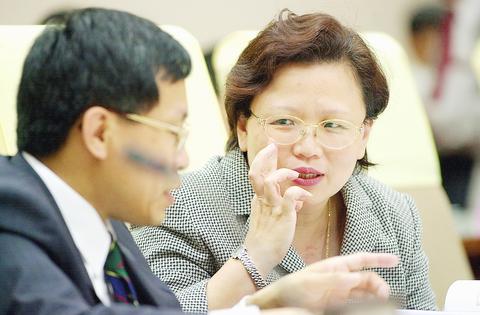Control Yuan members yesterday criticized three Cabinet officials for failing to respond early enough to warnings of an impending drought and failing to develop and protect water resources appropriately.
The Control Yuan yesterday held a meeting attended by Minister of Economic Affairs Lin Yi-fu (林義夫), Executive-General of the Cabinet's Drought Disaster Relief Center Kuo Yao-chi (郭瑤琪), Council of Agriculture Chairman Fan Chen-tsung (范振宗) and approximately 10 other officials from subordinate bureaus to report on the handling of the drought.

PHOTO: CHEN CHENG-CHANG, TAIPEI TIMES
The hearing's aim was to gather evidence to decide whether to launch a further investigation, which could result in the Cabinet ministers being punished.
Lin said that because of inconsistent weather forecasts, the drought contingency system had not functioned well.
He did not elaborate, but said, "The most important thing for the time being is increasing water storage capacity and coordination of the water supply."
Lin denied that the Ministry of Economic Affairs had been slow to announce plans to leave land fallow. He said that since the ministry became aware of the drought only at the end of February, "announcing that the plans would take effect from March 1 was reasonable."
There are widespread suspicions that the ministry was not sufficiently concerned in January, ignoring warnings from subordinates which resulted in farmers' losses when land was ordered to be left fallow.
Kuo denied that the Cabinet had implemented emergency measures too late.
"We did more than adhere to the relevant regulations, setting up the drought disaster center even before the seriousness of the drought had reached the level stated by the regulations," she said.
According to current regulations, the Cabinet must set up a drought disaster center when the shortage of tap water exceeds 30 percent of the quantity required to meet demand, or reservoirs are only 50 percent full.
Kuo said that the center was set up on May 1 under the orders of Premier Yu Shyi-kun, before the seriousness of the drought had reached the level of seriousness at which the regulations required that it be set up.
Control Yuan members put it to the officials, however, that, despite the regulations, they should have responded more quickly. Control Yuan member Huang Shou-kao (黃守高) criticized the officials for following the "inflexible regulations" while ignoring the fact that the drought was worsening all the time.
Another member, Chao Chang-ping (趙昌平), yesterday echoed Huang's comments
"The slow response has damaged the rights and welfare of the public," Chao said.
In addition, aiming at improving the problems posed by insufficient reserves of water, Control Yuan member Ma Yi-kung (馬以工) suggested that building water reservoirs is not the best solution.
She also called for more effort to be invested in the desalination of seawater as a long-term goal to replenish water resources.
The Control Yuan will deliberate further before deciding whether to launch a full investigation.

Chinese Nationalist Party (KMT) Chairman Eric Chu (朱立倫), spokeswoman Yang Chih-yu (楊智伃) and Legislator Hsieh Lung-chieh (謝龍介) would be summoned by police for questioning for leading an illegal assembly on Thursday evening last week, Minister of the Interior Liu Shyh-fang (劉世芳) said today. The three KMT officials led an assembly outside the Taipei City Prosecutors’ Office, a restricted area where public assembly is not allowed, protesting the questioning of several KMT staff and searches of KMT headquarters and offices in a recall petition forgery case. Chu, Yang and Hsieh are all suspected of contravening the Assembly and Parade Act (集會遊行法) by holding

PRAISE: Japanese visitor Takashi Kubota said the Taiwanese temple architecture images showcased in the AI Art Gallery were the most impressive displays he saw Taiwan does not have an official pavilion at the World Expo in Osaka, Japan, because of its diplomatic predicament, but the government-backed Tech World pavilion is drawing interest with its unique recreations of works by Taiwanese artists. The pavilion features an artificial intelligence (AI)-based art gallery showcasing works of famous Taiwanese artists from the Japanese colonial period using innovative technologies. Among its main simulated displays are Eastern gouache paintings by Chen Chin (陳進), Lin Yu-shan (林玉山) and Kuo Hsueh-hu (郭雪湖), who were the three young Taiwanese painters selected for the East Asian Painting exhibition in 1927. Gouache is a water-based

Taiwan would welcome the return of Honduras as a diplomatic ally if its next president decides to make such a move, Minister of Foreign Affairs Lin Chia-lung (林佳龍) said yesterday. “Of course, we would welcome Honduras if they want to restore diplomatic ties with Taiwan after their elections,” Lin said at a meeting of the legislature’s Foreign Affairs and National Defense Committee, when asked to comment on statements made by two of the three Honduran presidential candidates during the presidential campaign in the Central American country. Taiwan is paying close attention to the region as a whole in the wake of a

OFF-TARGET: More than 30,000 participants were expected to take part in the Games next month, but only 6,550 foreign and 19,400 Taiwanese athletes have registered Taipei city councilors yesterday blasted the organizers of next month’s World Masters Games over sudden timetable and venue changes, which they said have caused thousands of participants to back out of the international sporting event, among other organizational issues. They also cited visa delays and political interference by China as reasons many foreign athletes are requesting refunds for the event, to be held from May 17 to 30. Jointly organized by the Taipei and New Taipei City governments, the games have been rocked by numerous controversies since preparations began in 2020. Taipei City Councilor Lin Yen-feng (林延鳳) said yesterday that new measures by